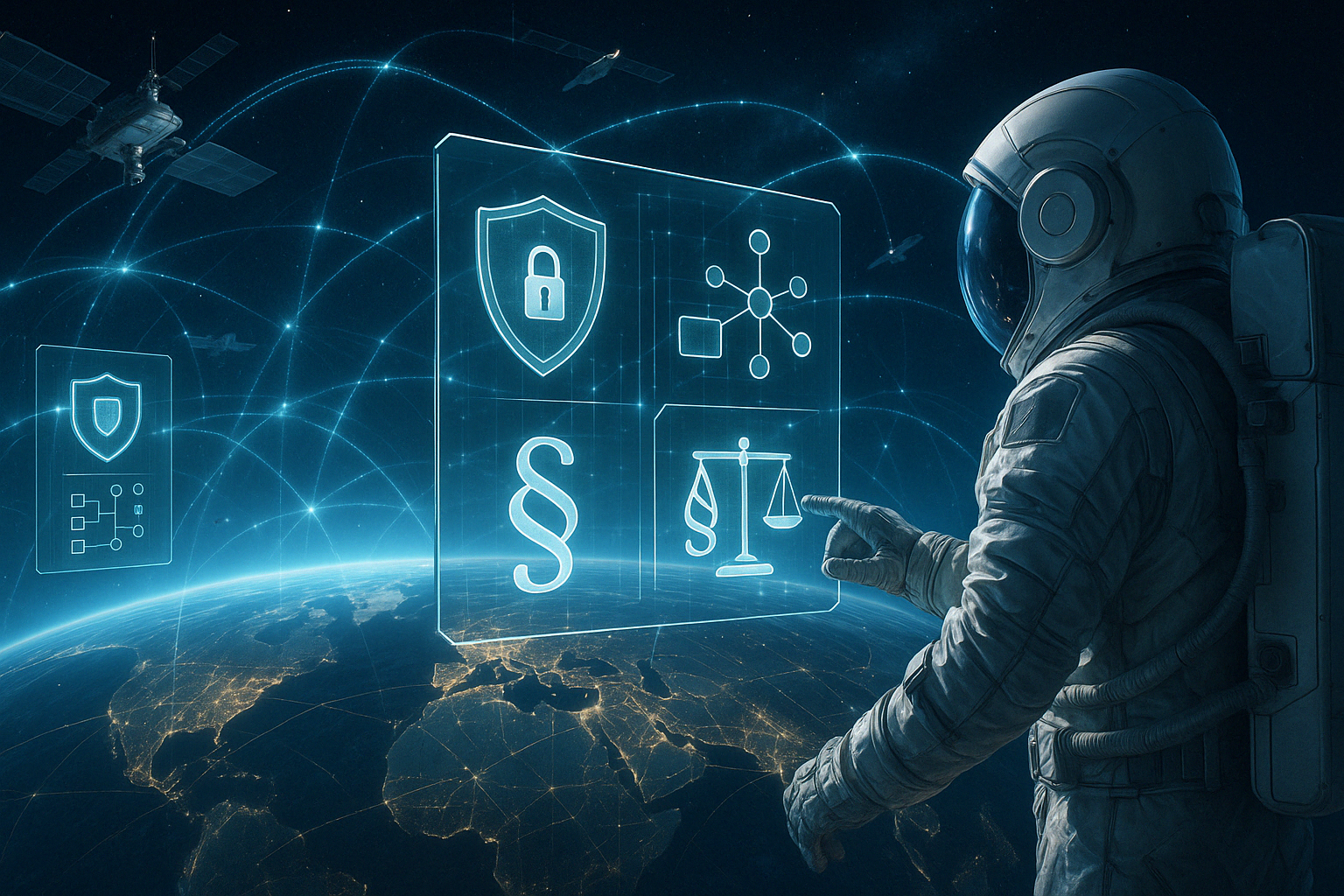An event exploring the European Union’s evolving role in space governance, technology, and international cooperation.
On day 1, a keynote lecture by Prof. Lesley Jane Smith addresses the constitutional and technological foundations of the EU’s space activities, tracing its growing competences, major programmes, and strategic ambitions under Article 189 TFEU (Treaty on the Functioning of the European Union).
On day 2, an expert panel critically examines the constitutionalisation of outer space law and policy across interconnected domains such as cybersecurity, connectivity, and data governance, highlighting the EU’s position in global space relations and its collaboration with key stakeholders like the European Space Agency.
26 May 2025
Day I: Keynote Lecture
The EU has an impressive record in mapping out its own space programmes (EGNOS, Galileo, Copernicus), including more recent legislative requirements for securing key national infrastructure, (NIS) further provisions for secure connectivity (CIS) and counteracting cybercrime (“hacking”), and most recently, awarding procurement contracts to roll out the construction and operation of a large secure satellite constellation for European Union governments, IRIS 2, known in the field as “govsatcom”. With this, the Union has staked a claim and secured its position as a technology-robust government stakeholder in space at regional European state level. The EU has crafted and developed its newer competences brought in under the well-known umbrella of Article 189 TFEU in the fields of European space research, European space programmes and European space policy. More recently, defence-related aspects have been included within its strategic space portfolio, along with moves for reforming e-communication law and coordinating frequency allocations and spectrum management at EU level.
In short: The European Union has developed the necessary legal instruments to procure and operate the level and quality of satellite-based operations concomitant with that required to govern and manage modern civil society. For a community of states that initially appeared somewhat constrained by the Lisbon Treaty as regards in its space activities, its space legacy is impressive, as it that of its approach to data.
The constitutional restrictions of Article 189(4) TFEU nevertheless remain. With increasing demands in the international arena for further space exploration, and challenging issues such as an increased reliance on AI and the ethics thereof, the sustainability of Planet Earth and Outer space, planetary resources mining, the subject of space activities in the EU, along with new forms of bilateral and multilateral declarations at international level, lends itself to closer legal and policy analysis. This applies all the more so, in times where private capital investment in the sector goes hand in hand with a marked visible presence of privately funded space corporations, whilst national state economies are flailing. As demand for commercially-operated space-based services such as satellite broadband increases, so do the prospects for life off earth. With this, the era of successor and further space stations beyond the International Space Station, and ILRS attract attention.
The key note lecture addresses the main legal issues relating to the activities of the EU in the space sector from a constitutional and technological perspective, with regard to its own programmes, and the status of the EU within international community.
-
16.00 – 16.15
Welcome Words
Prof. Takis Tridimas (Director, Luxembourg Centre for European Law, University of Luxembourg) -
16.15 – 17.00
Keynote
Prof. Lesley Jane Smith (Leuphana University Lüneburg) -
17.00 – 17.30
Comments
Prof. Mahulena Hofmann (Faculty of Law, Economics and Finance, University of Luxembourg)
27 May 2025
Day II: Constitutionalisation of Outer Space: Europe and Beyond
This expert panel is convened to explore and critically reflect on the evolving landscape of EU proposals and legislation across the increasingly interconnected domains of electronic communications, connectivity, data governance, cybersecurity, and space regulation. In particular, it will examine how these frameworks aim to ensure the safety and security of space operations in Europe and support civil society’s growing reliance on satellite-based infrastructures. A key focus of the discussion will be the constitutional dimensions of outer space law and policy—probing questions of legal authority, institutional competence, and the foundational principles guiding Europe’s approach to space governance. The panel will also delve into the division of competences between the EU and its Member States, as well as the dynamics of international cooperation with stakeholders such as the European Space Agency.
-
11.00 – 11.15
Welcome Words
Prof. Takis Tridimas (Director, Luxembourg Centre for European Law, University of Luxembourg) -
11.15 – 13.00
Expert panel
- Dr Olga Batura (Independent Consultant; TNO)
- Philippe Clerc (Centre national d’études spatiales, CNES)
- Dr Mathias Link (Luxembourg Space Agency)
- Prof. Lesley Jane Smith (Leuphana University Lüneburg)
- Dr Dimitra Stefoudi (Leiden University)
moderated by
- Dr Gabrielle Leterre (Faculty of Law, Economics and Finance, University of Luxembourg)
- Dr Günes Ünüvar (Luxembourg Centre for European Law, University of Luxembourg)
Contact
© Photo: Sora – AI
